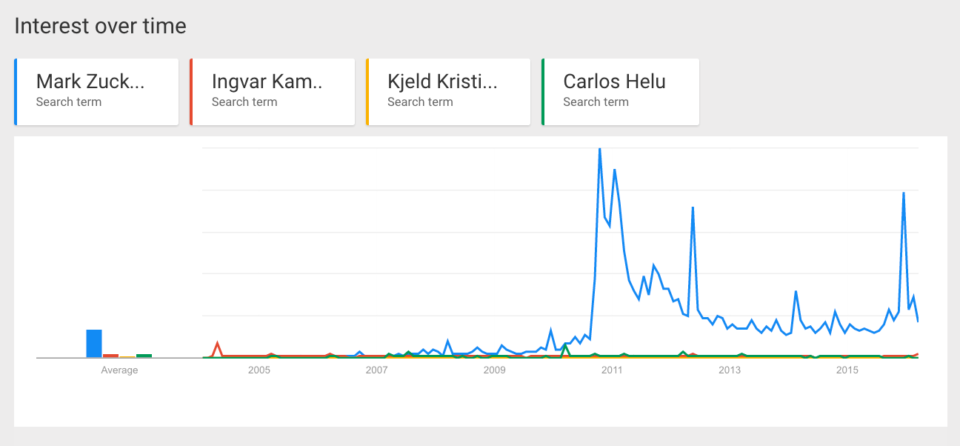Your secret success fantasy
A lot of people want to be the next Mark Zuckerberg.
https://twitter.com/Duke_Saragono/status/250633369975672832
https://twitter.com/NoSckress/status/394657109062975488
What part of Zuckerberg's success do they want? Maybe it's the money. If you're struggling to pay the bills, Mark's billions are tantalizing. But once you get past $200k, $500k, $1 million a year... does the money still motivate you?
It's also odd that the same names keep coming up: Mark Zuckerberg, Bill Gates, Steve Jobs, Larry Page.
Why not Kjeld Kirk Kristiansen? He's worth $9.4 billion, and his family started LEGO. There's also Carlos Slim Helu. He's worth more than Zuck ($72.9 billion). Have you heard of Ingvar Kamprad? He founded Ikea. Nobody seems interested in them.
There's something we want more than money.
Imagine you're walking down the street. You're about to duck into a coffee shop when someone stops you. Nervously, they whisper:
I just want to say, I really admire your work.
How does that make you feel?
Now imagine you're at your high school reunion. An old acquaintance approaches and asks: "So what are you doing now?"
Which would you rather be: a janitor or business owner?
Statistically most folks will choose "business owner." Is this because an entrepreneur is wealthier than a janitor? It goes deeper than that. Let's do the exercise again, but with these two choices:
- Funeral director
- College professor
Funeral directors make more money, but "college professor" feels more appealing, doesn't it?
Even though Carlos Helu has a greater net worth, the public is more interested in Mark Zuckerberg.
We want something greater than wealth: we want to be known.
"Individual behavior is motivated in large part by the desire for prestige, esteem, popularity, or acceptance."
- Douglas Bernheim, A Theory of Conformity
What's your status?
I'm fascinated by how our culture defines success.
Sociologists tell us that humans use power, property and prestige to measure status. Of the three, our culture is increasingly focusing on prestige.
The recent phenomena of internet fame is a good example. We join Instagram hungry for "likes." We post on Snapchat, hoping for views. Getting "recommends" on Medium boosts our ego. We aspire for retweets.
"We want strangers to want to meet us, as much as we want to meet a famous stranger."
- Merlin Mann, Reconcilable Differences
Is it bad to want to be liked?
I don't buy this nonsense that being well known isn't helpful. I've noticed a direct correlation. The more people that appreciate my work, the more opportunities I seem to get. It's disingenuous to say that stature doesn't matter.
It's not "bad" to want to recognition. That's normal. What's unhealthy is the desperation:
- teens desperate for compliments on Instagram
- authors desperate to have a best seller
- software entrepreneurs desperate to be #1 on Product Hunt
It's a viscous cycle. Everyone is focused inward. There's less outward praise, which results in more people being starved for attention.
There's a huge opportunity here. While everyone else is chasing internet fame, you can be different. You can focus on understanding people better.
Why?
Because human beings are hungry for connection. Deep down, they want to be understood.
The better you understand people, the better you'll be able to serve them. You'll create better art, write better books, and build better software.
"Steve [makes product decisions] based on a sense of people."
- Bill Gates
Self-focus doesn't produce good work. Use your work to care for others.
Don't try to be well known; try to know other people well.
Regards,
Justin Jackson
@mijustin
PS: if you like this post, you might like my newsletter.
Thanks to Simon Doggett for the photo, and to everyone who gave me feedback on this article!
